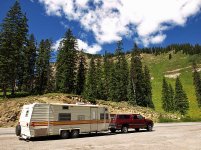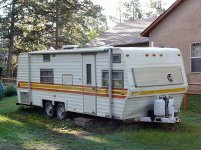Consider that these Chinese tire manufacturers can put anything they want on the side of their tires. These brands are blowing out left and right... so what can anyone do about it? Nothing and that is exactly the business model. Only thing you can do is not run them on your RV.
Take a Towmax 235/85/16 Load E tire is weights 36.1lbs and is rated to carry 3640lbs. at 80psi.
http://www.towmaxtires.com/tires/Landing.aspx?application=towmax2-product-line
Take a Goodyear G614 235/85/16 Load G tire weights 57.5lbs and is rated to carry 3750lbs. at 110psi.
http://www.goodyearrvtires.com/tire-selector.aspx
So a tire that weights that much more can only carry another 110lbs. load?
Just use some common sense.
Take a Towmax 235/85/16 Load E tire is weights 36.1lbs and is rated to carry 3640lbs. at 80psi.
http://www.towmaxtires.com/tires/Landing.aspx?application=towmax2-product-line
Take a Goodyear G614 235/85/16 Load G tire weights 57.5lbs and is rated to carry 3750lbs. at 110psi.
http://www.goodyearrvtires.com/tire-selector.aspx
So a tire that weights that much more can only carry another 110lbs. load?
Just use some common sense.


